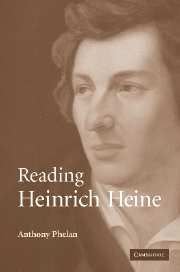10 - Mathilde's interruption: archetypes of modernity in Heine's later poetry
Published online by Cambridge University Press: 22 September 2009
Summary
… but he did not find archetypes of modernity.
(Adorno)‘Die Wunde Heine’, Adorno's centenary radio-talk for 1956, tries to fix Heine's historical position by way of a comparison with Baudelaire. By being subjected to the processes of reproduction in the literary sphere, Heine had been brought into direct contact with the most modern currents of the nineteenth century – ‘Heine, like Baudelaire, looms large in the modernism of the nineteenth century’; but while Baudelaire heroically extracts a dream and an image from the increasingly corrosive experience of modernity, transfiguring the loss of all images itself into an image, Heine apparently, in his own historical moment, was unable to develop sufficient resistance to the development of capitalism. He applies techniques of industrial reproduction to an inherited repertoire of Romantic archetypes, but the other modernity – the modernity of the city – is reserved for Baudelaire.
Adorno's notion of such archetypes almost certainly derives from his knowledge of Benjamin's Arcades (Passagen) project from the 1930s. To a very large extent Adorno and Benjamin were unfamiliar with the corpus of Heine's work beyond Buch der Lieder. The Arcades indicates that Benjamin had begun to consider Heine mainly because of Baudelaire's sympathetic interest in him. In 1935 Adorno suggested Heine might be expected to provide further evidence of the process of commoditization.
- Type
- Chapter
- Information
- Reading Heinrich Heine , pp. 209 - 242Publisher: Cambridge University PressPrint publication year: 2007



